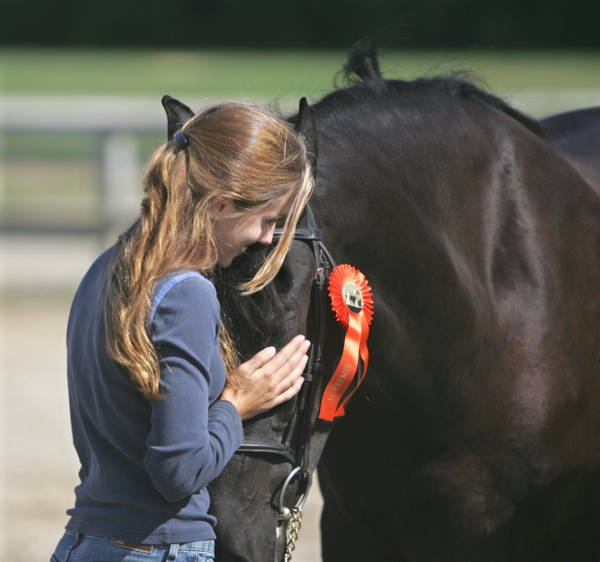Friesian horses always inspire the imagination with their beautiful flowing locks, rich black coats, and elegant gaits. They are many people’s dream horses and surrounded by an element of mystery. Because of this, there are lots of Friesian horse questions we get asked on a regular basis. I wanted to share these questions and answers to help demystify the Friesian horse.
Here are the top 10 Friesian horse questions and answers!
1. What makes Friesian Horses so special?
We are incredibly biased in this answer as we have owned Friesian horses for years. We believe the general confirmation with a high head carriage and arching neck adds to the overall magnificence of the breed. Friesians also have natural floating, animated gaits, especially at the trot. Selective breeding over the past several hundred years has further cultivated their active gaits. And, last but not least, Friesian horses are literal gentle giants. They are incredibly sweet, very intelligent, and have strong work ethics.
2. Do Friesian Horses have health issues?
Friesians are generally very healthy, but are prone to a few genetic issues. Inbreeding in the KFPS is carefully monitored in an effort to prevent these genetic issues from continuing or getting worse within the breed. Here are the most common genetic issues in the Friesian breed.
- Dwarfism
- Hydrocephalus (excess fluid in the skull)
- Retained placenta
- Aortic rupture
3. Do Friesian Horses have to be black?
Friesian horses are almost always black, but they are not always. Some Friesian lines carry the “Chestnut factor” which can result in a Chestnut Friesian. This is not a desired trait in the KFPS and chestnut Friesians cannot be registered in their studbook. Some white on a black Friesian is allowed on the forehead, but it is a very small amount.
4. Where do Friesian Horses come from?
Friesian horses originated in Friesland – a province of The Netherlands (Holland). The Friesian horse, one of Europe’s oldest breeds, was originally imported to North America in the seventeenth century but the breed was totally lost in North America due to crossbreeding. The Friesian was not reintroduced to North American until 1974. Want to learn more about the History of the Friesian horse? Check out our Friesian Horse History blog.
5. What can I use a Friesian Horse for?
Friesian horses are very versatile and can be used in riding for pleasure and in competition for dressage, driving for pleasure and in competition and even for light farm work. Unlike some other European warmbloods, Friesians have not been bred as jumpers, though some owners enjoy jumping their Friesians.
Check out our What can I do with a Friesian Horse blog for more!
6. What does Ster mean?
When a mare or gelding enters the adult studbook, the best 25-30% are awarded Star (Ster) status. This designation appears on the horse’s registration papers. The very, very best of the Ster mares can be awarded the designation of Model. Mare can receive the designation preferent (“Preferred”), if four of their offspring achieve star status or better. And mares with three offspring performing at the top levels in competitive sport can receive the designation of prestatie, or “Performance Mother”.
7. Is cross breeding allowed?
The rules of FHANA strongly discourage the breeding of KFPS registered Friesian horses with other breeds.
8. What is their temperament like?
Friesian horses are very calm and have an excellent temperament for any level of rider. They have very strong work ethics and will work hard to please their owners. Friesian horses quickly become the “barn favorite” and a part of the family due to their kind natures.
9. Is a Friesian horse the right horse for me?
A reasonable question if you are considering buying a Friesian. Friesian horses are very versatile and have wonderful personalities. That being said, if you are looking for a show jumper, this is not the breed for you. Friesian horses excel in dressage, driving, and trail riding. They are calm and tend to adapt to new situations well, so they are also well suited for exhibitions and parades.
10. What is a keuring?
A keuring is an inspection process where judges evaluate the quality of conformation and movement. Once per year, a team of officials from the KFPS travel throughout North America to inspect Friesian horses. They use this evaluation process to determine the success of our breeding programs with the ultimate goal of improving the breed. Horses are judged first as foals and again at 3 years old. Premies (premium) are awarded by the judges at this time based on the quality of the horse. The awarded rating will be added to that horse’s registration papers.

I’ve been around horses my entire life, but my Friesian journey started just over 20 years ago. Our horses have always been a part of our family. They have traveled with us as we relocated from Vermont to New York to Iowa and finally, to Arizona. I can’t wait to share our story with you!
Related
May 26, 2021
We’ve Answered the Top 10 Friesian Horse Questions

Leave a Reply Cancel reply
@starlitridgefriesiansandfells
LET'S BE FRIENDS ON INSTAGRAM